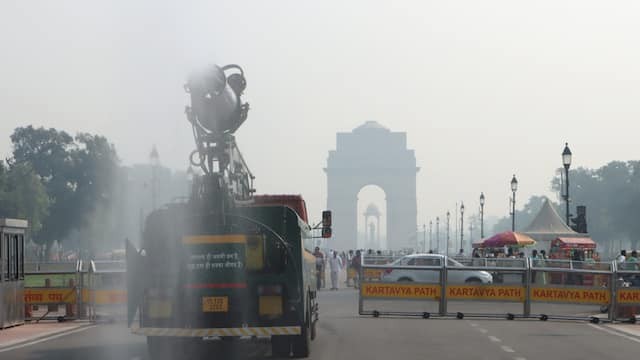New Delhi: After a slight improvement on Monday morning, Delhi’s Air Quality Index (AQI) fell to the ‘very poor’ category by evening because of sluggish winds, remaining at the same level on Tuesday morning, with AQI readings between 300 and 440 at most monitoring stations.
Delhi AQI Today
The city’s Air Quality Index (AQI) was recorded at 285 at 9am, classified as ‘poor’ by the Central Pollution Control Board (CPCB), the lowest since October 29 when it was 268. During the night, the air quality index rose above 400 at several monitoring sites, showing a reintroduction of ‘severe’ conditions.
Delhi Weather Report
According to the India Meteorological Department (IMD), the daytime temperature on Monday was 25.8 degrees Celsius, which was 0.9 degrees lower than the seasonal average. Moderate fog is expected on Tuesday, with temperatures reaching around 26 degrees Celsius and dropping to 12 degrees Celsius.
Short Lived Relief
On Monday, the AQI in Delhi improved marginally, with the pollution level going below the 300-mark on Monday morning. Moreover, there was finally some green in Delhi, with the Lodhi Road (IITM) monitoring station logging an AQI of 95, what the CPCB categorises as the ‘satisfactory’ level.
What’s causing the pollution in Delhi?
The Centre’s Decision Support System (DSS) for Air Quality Management estimated that vehicular emissions contributed 16.4 per cent to Delhi’s pollution on Monday. Stubble burning, another major factor, accounted for 11 per cent of the capital’s pollution on Sunday. Bhavreen Kandhari, an environmentalist, told news agency PTI that the AQI rose due to a combination of stagnant winds that have a speed of less than 10 kilometres per hour and dropping temperatures that trap pollutants close to the ground.
SC Considers Reopening Schools
Delhi’s air quality remains poor, prompting the Supreme Court to urge the CAQM to consider reopening schools and colleges in the NCR. The Court noted student’s lack of access to mid-day meals and virtual classes. Following this, the CAQM relaxed restrictions under GRAP, allowing educational institutions in Delhi and nearby areas to operate in a hybrid format. Students can choose to attend classes in person or online, ensuring access to education during air quality concerns.
SC raps Delhi govt over GRAP 4 curbs
Last Sunday, November 17, the air quality in Delhi reached hazardous levels, with AQI surpassing 450 for the first time this season, prompting the implementation of GRAP 4, which the Supreme Court on Monday said is not being done properly by the city government. The GRAP Stage 4 encompasses an 8-point action plan, including banning the entry of non-essential truck traffic into Delhi, except for trucks carrying essential commodities or providing essential services.

